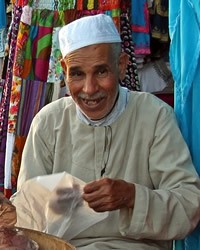Arab, Moroccan in Netherlands

Photo Source:
Monica Volpin - Pixabay
|
Send Joshua Project a map of this people group.
|
| People Name: | Arab, Moroccan |
| Country: | Netherlands |
| 10/40 Window: | No |
| Population: | 321,000 |
| World Population: | 31,513,800 |
| Primary Language: | Arabic, Moroccan |
| Primary Religion: | Islam |
| Christian Adherents: | 0.30 % |
| Evangelicals: | 0.05 % |
| Scripture: | New Testament |
| Ministry Resources: | Yes |
| Jesus Film: | Yes |
| Audio Recordings: | Yes |
| People Cluster: | Arab, Maghreb |
| Affinity Bloc: | Arab World |
| Progress Level: |
|
Introduction / History
Post WWII was a time when northern European countries offered employment to people from the Muslim world. That included Arabs from many countries including Morocco. They were called “guest workers,” and the understanding was they would return to their country of origin after a couple of years. This situation involved agreements between the governments of the Netherlands and Morocco.
There were three waves of Moroccan “guest workers” coming there. In the Netherlands, the smallest wave came soon after the war was over. The second wave happened between 1965-1973 and the third was between 1974-86. Starting in 1974 In 1974, Moroccans were allowed to have their families join them in the Netherlands. Now they are settled there. The Netherlands now has a large Moroccan population.
What Are Their Lives Like?
Every year, foreign students arrive in Amsterdam to pursue advanced degrees. Many are Arab Moroccans, who must study and pass courses in a second or third language. They are without families and friends. Western, secular culture and values assault them from all directions: advertisements on TV and radio, in magazines and in shop windows. Often, they succumb to the allure of easy money, casual sex and drugs. Women are especially vulnerable. They come from a culture where their behavior is strictly regulated by Muslim-based laws and a conservative culture. In the Netherlands they are suddenly exposed to complete freedom. Lonely and confused, they are easy targets for exploitation.
If it can be proven that a Muslim woman has engaged in premarital sexual relations, she is shunned by her family (or worse) and deemed unsuitable for marriage. Often the students' difficult situations make them more open to believers who offer love and friendship. When Christ's ambassadors extend his unconditional love to them, many long to know him more, and eventually give him their hearts. When the students return home strong in their new faith, they can potentially become "missionaries" to their own people groups.
Maintaining their identity while being surrounded by European culture is very important to Moroccan Arabs.
What Are Their Beliefs?
It is difficult for Moroccan Arabs in secularized Europe to maintain their Islamic identity. To do this, they sometimes get more immersed in Muslim activities, and stay clear of the European culture around them. Secular humanism isn't a formal religious system, and it has very little appeal to Moroccan Arab Muslims. Still, those who want to fit in with European culture probably become more secularized. It is hard to imagine where the Moroccan Arabs will be spiritually in a generation or two. Most likely, they will maintain their identity with Islam, but it will not affect their lives in the same way it did in Morocco.
What Are Their Needs?
People who genuinely follow Christ will need to patiently and lovingly take the opportunity to take Christ to the Moroccan Arabs in the Netherlands. They can do this in part by helping to teach language and work skills.
Prayer Points
Pray that God will raise up faithful intercessors who will stand in the gap for Moroccan Arabs in the Netherlands.
Pray that the softening of their traditional culture will soften their hearts so they will hunger for the truth and eagerly accept it when they hear it.
Pray for a church planting movement among Moroccan Arabic speaking people in the Netherlands that will show others the transforming power of the gospel in their lives.
Ask the Lord to raise up strong local churches and discipleship movements among Diaspora Arabs in Netherlands.